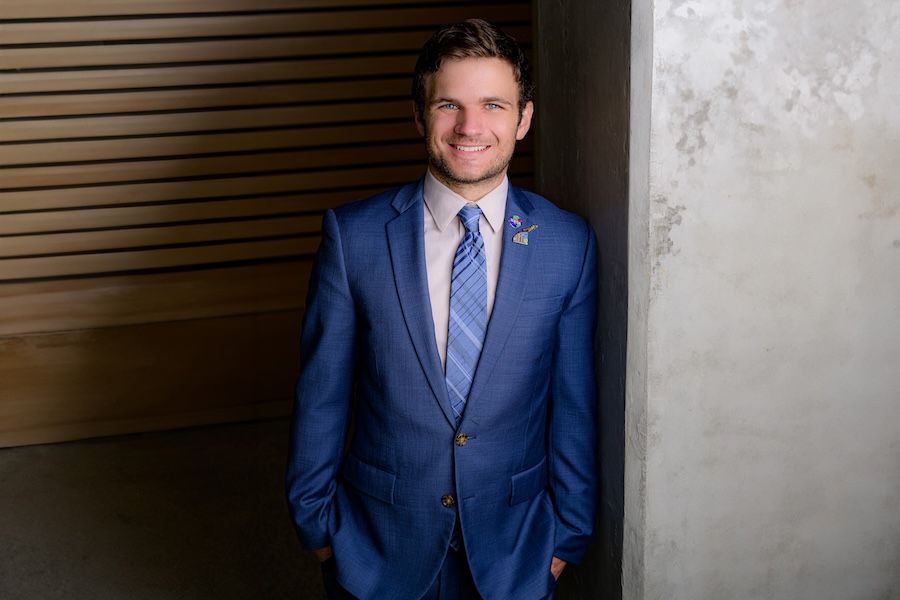Student Spotlight: Chandler Pruett

Chandler Pruett is a senior graduating this May, pursuing dual degrees in statistics and meteorology from the Department of Statistics and the Department of Earth, Ocean and Atmospheric Science, both part of FSU’s College of Arts and Sciences. His research interests include tropical meteorology with a focus on hurricanes. Pruett is an FSU Presidential Scholar and a recipient of an FSU IDEA grant for the project “Reshaping the Hurricane Cone of Uncertainty: A Study on Public Perception.” He participated in the President’s Showcase of Undergraduate Research Excellence in 2022.
Tell us about your background, and what brought you to FSU.
Not many schools offer meteorology, and FSU is one of the best. It was close to my home in North Carolina, there was good financial incentive, and FSU is well known for its tropical meteorology program. Attending FSU was a match made in heaven.
What inspired you to choose a dual degree?
I have been fascinated by the weather since I was about six years old. I enjoy finding patterns and numbers, so my mom suggested I should also pursue statistics. I had enough space in my program in terms of credits, so it was easy to switch to dual degrees.
Can you tell us a little bit about specific research you do?
During my freshman year, I looked at fractional dimensions in reference to the coastline paradox. When measuring a coastline, the more you zoom in, the more complex the coastline becomes, so you can never really measure it accurately.
My sophomore and junior year were more interesting as I researched the hurricane cone of uncertainty, which is the graphic we see on the news during hurricane reporting. Through funding from FSU's IDEA Grant program, our project asked people throughout the state of Florida their opinions and interpretations of the cone as a tool. We also showed different modifications for it, and our research found people instead preferred to be shown “zonal risks.”
Currently, the graphic only has the cone to show the hurricane’s possible reach. Instead, once it hits land, the cone could be replaced by zonal risk measurements that show what areas have high, medium, or low risks of impacts. Using zonal risks, the public can make more educated decisions during hurricane season.
My partner in the project, fellow meteorology student Robert Szot, and I recently presented these findings to the National Hurricane Center, and they took them into account. In August, NHC will be releasing an experimental graphic that is the first step towards incorporating our modified recommendation, which is very rewarding.
Why is this research important? Why should the public know about it?
Government agencies depend on two-way interaction between the government and the public for forecasts. Since the goal of the NHC and the National Weather Service is to serve the public by protecting lives and property, they want to be sure they are offering information the public wants in a way it can be understood. The public should be interested because they can eventually use outcomes from my work to make decisions and form opinions about the cone of uncertainty.
What is something people might not know about studying a discipline in atmospheric sciences?
There is a lot of math. Many people, including me, become interested in the weather when they see an amazing event or see huge atmospheric phenomena. Consequently, they might forget that there is a lot of math involved in studying these phenomena.
What on-campus resources have helped you throughout your time at FSU?
I have spent many nights in FSU Libraries, both Dirac and Strozier, studying for my finals. Additionally, the EOAS building has computer labs that let me access programs my personal computer does not have. I am very focused on the academics, but I also enjoy what FSU offers as far as extracurriculars. I enjoy sports such as soccer and hiking, as well as serving as a team leader on the FSU Weather program, a channel which allows students to practice their broadcast meteorology skills.
Are there any faculty or staff who have inspired you?
Associate professor of earth, ocean and atmospheric science Jon Alquist mentored me freshman year, and supervised my first research project. He taught me to be a researcher and passed down tips that I continue to use. I am already a workaholic, and he encouraged me to not push myself too hard. He has since retired, but his advocacy for an FSU Weather studio in the new EOAS building was hugely instrumental to where I work now.
What are some current goals and projects you are working on?
My honors thesis looks at the National Oceanic and Atmospheric Administration’s Hurricane Hunters’ missions and catalogs their observations to find how often they sample gale force, or tropical storm force winds. As meteorologists, we want to know how big the extent of the wind field is because it can help us better predict storm surge as well as which bridges and emergency services should close for evacuations.
Despite missing FSU, what are you looking forward to once you graduate?
I plan on sticking with academia for another two to seven years. I am pursuing my master's degree on tropical cyclone research at Pennsylvania State University, and after that, I plan to get my doctorate. I have learned so much from FSU, but my professors encouraged me to broaden my perspective, which is why I plan on going elsewhere for my graduate degree.
What advice do you have for fellow students?
Maintain work-life balance. So often, I would continuously work until 10 p.m., and the only interaction I would have was with my roommates. If you are a workaholic, setting aside intentional time to meet friends and care for yourself is vital. As a senior, I wish I could have spent more time with the people I met here. My recommendation is to pour more time into relationships and reflect on what work-life balance truly means to you.
